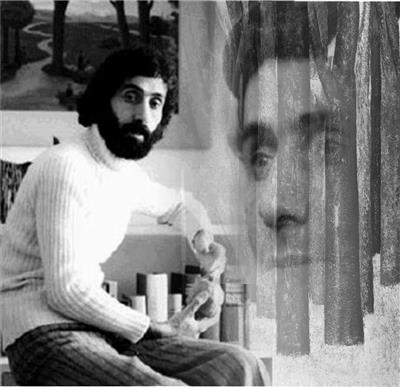|
Getting your Trinity Audio player ready...
|
Journey Through Distance: Sohrab Sepehri’s Poetic Wisdom
Introduction: Who Was Sohrab Sepehri to Us?
Sohrab Sepehri isn’t just a poet we admire; he’s part of who we are as Persians. His words feel like a conversation with our souls, reminding us of the deep connection between humanity and nature, between our inner world and the universe. Born in Kashan, a city where simplicity and beauty intertwine, Sepehri’s poetry reflects the essence of life itself—quiet, reflective, and profoundly moving.
He wasn’t just a poet; he was a painter of emotions, blending mysticism with everyday life, showing us how to see the extraordinary in the ordinary. In his famous collection, The Oasis in the Moment, Sepehri invites us on a journey—one where every line feels like a step toward understanding ourselves and the world around us.
The Poem: A Traveler’s Reflection
One of Sepehri’s most beloved poems captures the essence of a solitary journey. Picture it: a traveler at dusk, sitting quietly, reflecting on the beauty and melancholy of the world passing by. Here’s the full poem:
It was dusk.
The whispers of plants could be heard.
A traveler had come
And sat on a comfortable chair beside the grass:
*”My heart is heavy,
Strangely heavy.
All the way, I thought of one thing,
And the colors of the slopes took my breath away.
The lines of the road disappeared in the sadness of the plains.
What strange valleys!
And the horse, do you remember,
Was white
And grazed on the silent green, like the word purity.
Then, the colorful loneliness of the villages along the way.
And then, the tunnels.
My heart is heavy,
Strangely heavy.
And nothing,
Not these fragrant minutes, fading on the orange branch,
Not the honesty of a word, whispered between the leaves of this night-blooming jasmine,
Nothing can rescue me from the emptiness that surrounds me.
And I think,
This rhythmic tune of sadness will echo forever.”
The traveler’s gaze fell to the ground:
“What beautiful apples!
Life is the intoxication of solitude.”
And the host asked:
“Beautiful? What does that mean?”
“Beautiful means the romantic interpretation of forms.
And love, only love,
Leads you to the warmth of an apple.
And love, only love,
Took me to the vast sorrow of life,
Took me to the possibility of becoming a bird.”
“And the remedy for sorrow?”
“The pure sound of elixir flows from this remedy.”
And now, it was night.
The light was on.
And they drank tea.
“Why is your heart heavy, as if you’re lonely?”
“How lonely I am!”
“I think you’re caught in the hidden vein of colors.”
“Caught? What do you mean?”
“In love.”
“And think, how lonely
A little fish is
If it’s caught in the endless blue of the sea.”
“What a tender and sad thought!”
“And sadness is the hidden smile of the gaze of plants.
And sadness is a subtle gesture to the unity of things.”
“Blessed are the plants that love the light,
And the outstretched hand of light rests upon their shoulders.”
“No, union is impossible,
There is always a distance.
Even though the curve of water is a soft pillow
For the delicate sleep of the lotus,
There is always a distance.”
*”One must be caught,
Or else the whisper of life between two words
Will be wasted.
And love,
Is the journey toward the radiance of solitude.
And love,
Is the sound of distances,
The sound of distances
- Drenched in ambiguity
- No,
The sound of distances as clean as silver
That tarnish with the echo of a nothing.”*
*”Always, the lover is alone.
And the lover’s hand is in the tender grip of moments.
And they—moments and the lover—go to the other side of the day.
And they—moments and the lover—sleep on the light.
And they—moments and the lover—offer the best book in the world
To the waters.
And they know well
That no fish ever
Untied the thousand-and-one knots of the river.
And at midnight, with the old canoe of intuition,
They drift into the waters of guidance,
And journey toward the revelation of wonder.”*
“Your words carry the air of
Passing through the garden-paths of stories,
And in the veins of such a tone,
Flows a fresh and melancholy blood.”
Reflections: What This Poem Means to Me as a Persian
This poem isn’t just about a traveler sitting in solitude; it’s about all of us, caught between longing and presence, between beauty and sadness. Sepehri’s words speak to a part of our Persian soul that values reflection, that sees life as a blend of light and shadow.
- The Traveler’s Loneliness: For me, this poem reflects the reality of modern life—always moving, always searching, yet often feeling the ache of separation. Sepehri doesn’t try to fix this feeling; he honors it. He reminds us that distance and longing are natural, even beautiful.
- The Role of Nature: The white horse, the apples, the plants loving the light—they’re not just symbols; they’re part of a Persian way of seeing the world. We find meaning in the simplest things, like a warm cup of tea or the quiet glow of the moon.
- Love and Distance: When Sepehri says, “Always, there is a distance,” it feels deeply personal. It’s not just about physical separation—it’s the spiritual distance we feel from the wholeness we long for. Yet, it’s in this space that love lives, in the effort to bridge that gap.
Jungian Analysis: A Journey into the Psyche
Sohrab Sepehri’s poem can be explored deeply through a Jungian lens, where the archetypes, symbols, and interplay of the conscious and unconscious reveal profound psychological insights.
The Archetype of the Traveler: The Seeker’s Path
The traveler in the poem represents the Seeker archetype, a recurring motif in Jungian psychology that symbolizes the individual’s quest for meaning and self-discovery. The journey through landscapes, tunnels, and valleys reflects the process of individuation, where the ego moves toward integration with the unconscious to achieve wholeness.
- The Train as a Symbol: The train’s movement is a metaphor for life’s unrelenting progression. The tunnels, dark and mysterious, represent the shadowed parts of the psyche, while the open plains symbolize the expansive potential of self-awareness.
- Solitude and Reflection: The traveler’s melancholy and reflections mirror the isolation that often accompanies self-exploration. This loneliness isn’t an emptiness to fear but a space to encounter the deeper layers of the self.
Nature as the Mirror of the Psyche
Nature, in Sepehri’s poem, acts as a symbolic representation of the collective unconscious, which Jung described as the shared reservoir of archetypes and experiences that connect all human beings.
- The White Horse: Grazing “like the word purity,” the horse reflects the untouched, unspoiled aspects of the unconscious. It is both a reminder of innocence and a call to integrate purity into the complexities of the conscious mind.
- Plants and Light: The line, “Blessed are the plants that love the light,” highlights nature’s instinctive unity with its source, something humans often lose and must strive to reclaim through introspection and self-awareness.
The Shadow and the Anima
The traveler’s heavy heart and the acknowledgment of loneliness reflect an encounter with the Shadow—the unacknowledged, often darker parts of the psyche. Confronting the Shadow is a necessary step in Jung’s individuation process, as it allows for integration and transformation.
- Sadness as a Teacher: The speaker’s admission that “sadness is the hidden smile of the gaze of plants” reframes sorrow as a bridge to deeper understanding. The Shadow isn’t just a source of pain but a guide to growth.
- Love as the Voice of the Anima: The poem’s exploration of love reveals the Anima archetype, representing the emotional and intuitive aspects of the psyche. Love, as Sepehri describes it, is a transformative force that bridges the gap between opposites—light and shadow, loneliness and connection.
Distance as a Psychological Reality
The recurring theme of distance is particularly Jungian. Distance symbolizes the tension between the ego and the Self—the totality of the psyche. While the ego yearns for union, the Self often feels unreachable, creating a sense of perpetual longing.
- Living in the In-Between: The realization that “there is always a distance” speaks to the human condition. This gap is not a failure but a vital space where creativity, love, and transformation occur.
Through a Jungian lens, Sepehri’s poem becomes more than a reflection on life’s melancholy—it is a roadmap for navigating the depths of the psyche. It reminds us that sadness, longing, and distance are not obstacles but essential components of the journey toward self-discovery and wholeness.
Carrying Sepehri’s Whisper
Sepehri’s poetry isn’t something you just read—it’s something you carry with you. It reminds me to pause, to look at the beauty around me, even if it’s tinged with sadness. His words, especially as a Persian, feel like a mirror to my own thoughts and emotions, a guide through the complexities of being human.
As I reflect on this poem, I feel grateful for Sepehri’s gift—the ability to turn life’s fleeting moments into something eternal. Through his words, I’ve learned to see distance not as a barrier, but as a space where meaning and connection are born.
And maybe that’s what being Persian really means—to find poetry in everything, to hold the world’s beauty and sorrow in the same hand, and to let love guide us through it all.

